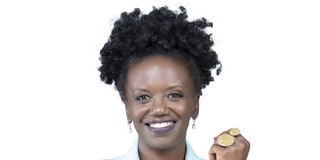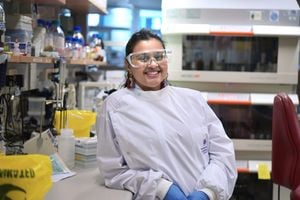
Mendi Njonjo is the KCB Foundation Director.
Mendi Njonjo is calculative—carefully reflecting on each question before answering. Ms Mendi is an international development and philanthropy strategist and practitioner.
With over 25 years of experience working with civil society and philanthropic organisations on policy analysis, strategic planning, and international grant-making, she currently serves as the Director of the KCB Foundation. Previously, she held roles both in the United States and regionally.
Tell us a little about your childhood and how it shaped the person you are today
I was born in Nairobi, but I like to say that Thika raised me. That’s where I grew up, in a community that believed in service. My dad was very active in the Red Cross, and my mom was always involved in community work, especially with the less privileged. Those experiences shaped me, watching people go beyond themselves to help others. I grew up with the belief that we are here to serve our communities. It wasn’t just something I heard; it was something I saw every day at home. My parents were deeply committed to making a difference, and I internalised that from a young age. That’s the foundation of who I am today.
Is there a particular childhood memory that stands out for you?
Absolutely. I vividly remember one incident. When I was about six years old, I went to Uhuru Park for a Girl Scout meeting. Somehow, I missed the school bus home and found myself wandering around the park, completely lost. After a while, I sat down, feeling overwhelmed and unsure of what to do. Then, a reverend approached me and asked if I was lost. He was so kind and took it upon himself to take me home.
My parents had been frantic, searching for me everywhere. That small act of kindness left a huge impression on me. It taught me how much one person’s actions can change someone’s life. That reverend didn’t have to help me, but he did, and I carry that lesson with me. It’s a reminder that even small, thoughtful actions can have a significant impact on others.
How did your time in high school and university shape your path?
I went to Ngandu Girls’ High School (now Bishop Gatimu Ngandu Girls High School) in Karatina. Everyone there was either the top or second in their class, so you were constantly surrounded by high achievers. That environment pushed me to keep striving for excellence. It wasn’t about competition as much as it was about being inspired by those around me.
The friendships and connections I made during that time have stayed with me throughout my life. After Ngandu Girls, I attended the University of Nairobi where I studied double Mathematics and Geography. My choice to study double maths wasn’t part of some grand plan—it was more of a "why not?" decision. I’ve always enjoyed math, so I thought, why not give it a shot? In hindsight, it was a great decision. Being in an environment where excellence was expected shaped both my academic and professional life.
Later, you pursued a Master’s degree in Conflict Resolution. What drew you to that field?
After my undergraduate studies, I transitioned to working at the International Federation of the Red Cross, and this was a turning point for me. It was the mid-90s, during a period of significant turmoil in East and Central Africa. This was shortly after the Rwanda genocide, and there were refugee crises, civil wars, and other humanitarian emergencies in the region.
My work focused on supporting the Red Cross societies in these countries, and I saw firsthand the devastation that conflict brings. It wasn’t just numbers or statistics—it was real people, real lives affected by violence. That experience made me want to do more than just respond to crises. I wanted to understand how we could prevent conflicts before they erupted. That’s what led me to pursue a Master’s degree in Conflict Resolution at the University of Massachusetts in Boston.
What challenges have you faced as a woman of colour in leadership, and how have you navigated them?
Being an African woman in global leadership, especially in the nonprofit sector, comes with its challenges. There are preconceived notions of what a leader should look like, and I’ve had to navigate that. When I served as the Director for East Africa at Hivos, the first Black woman to hold that position, I remember people often asking, “So, when is your boss coming?” assuming I couldn’t possibly be the regional director. I had to explain that I was, in fact, the boss.
But I’ve always been clear about one thing: if you’re the first, you need to make space for the second and third. I felt a strong responsibility to ensure my leadership opened doors for others. I didn’t want to be the only one, and I knew the best time to step down and make room for others was when things were going well. That’s why I eventually decided to step aside after two terms, although I did an additional year due to COVID.
How do you balance a demanding career with your personal life?
I’ve come to realise that life is all about seasons. There are times when work demands more of you, and there are times when you need to rest and recharge. Balance doesn’t mean giving 50-50 to everything all the time. For me, it’s about recognising when to push hard and when to pull back. My mantra is “progress, not perfection.” I don’t strive for perfection because I know it’s unattainable. Instead, I focus on being better today than I was yesterday. I’ve been fortunate to work for organisations that understand the need for rest. Taking time off when necessary has allowed me to return to work with fresh energy and perspective. That’s how I maintain my personal and professional life.
Looking back, what accomplishment are you most proud of?
If I had to pick one thing, I would say I’m proud of staying true to myself throughout my career. It’s easy to feel the pressure to conform, especially as you rise through the ranks. But I’ve worked hard to lead in a way that feels authentic to me. I’ve never tried to adopt the patriarchal, top-down leadership style that some people expect from women in high-level positions. Instead, I’ve embraced a collaborative approach to leadership—one that is based on empathy and inclusion. I’m proud of that, especially in a world that often expects women to lead in a very particular way.
What advice would you give to young women, especially those just starting their careers?
My advice to young women is to give yourself space to grow into the person you’re meant to be. There’s a lot of pressure on women to constantly improve and change, to always be better. But there’s beauty in allowing yourself to evolve naturally, without feeling the need to adjust who you are. That doesn’t mean you stop striving for success, but it’s important to be patient with yourself along the way. And remember, progress, not perfection. It’s okay to not have it all figured out immediately.
What’s your take on the importance of mentorship?
Mentorship is crucial. We are who we are because of the people who have mentored us, whether formally or informally. Men often get mentorship through informal networks—on the golf course or over drinks—but women don’t always have those spaces. That’s why it’s so important for women to seek out mentors and to mentor others as they progress in their careers. Mentorship creates opportunities for growth, and it’s been instrumental in my journey.
What’s on the horizon for Mendi Njonjo?
Right now, I’m focused on my work at KCB Foundation. We’re working on exciting initiatives around financial inclusion, youth empowerment, and reducing female unemployment in East and Central Africa. Our goal is to create mass entrepreneurship and employment opportunities. It’s a bold vision, but I believe in the work we’re doing, and I’m excited to see where it leads. We want to shift the conversation around unemployment and help more people access the tools they need to succeed.
What’s your current read?
(Laughing) I’m currently rereading a book titled All Men in Lagos Are Mad. It’s hilarious! Other than that, I’m also reading some work-related materials.







